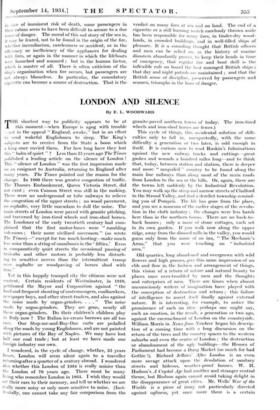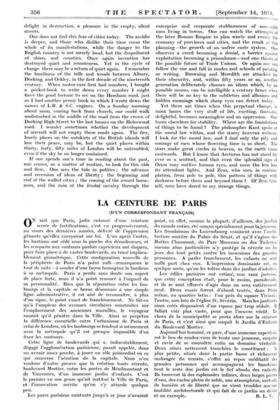LONDON AND SILENCE
By E. L. WOODWARD
THE shortest way to publicity appears to be at this .moment--when Europe is agog with trouble —not in the appeal " England, awake," but in an effort to send wakeful Englishmen to sleep. The King's subjects are to receive from the State a boon which a king once envied them. For how long have they lost this balm of quiet " ? Less than 25 years ago The Times published a leading article on the silence of London ! This " silence of London " was the first impression made on an emigrant to Australia, returning to England after many years. The Times pointed out the reason for the change. In 1860 there was greater congestion of traffic. The Thames. Embankment, Queen Victoria Street, did not exist ; even Cannon Street was still in the making. There were no underground or tube railways to relieve the congestion of the upper streets ; no wood pavement, no asphalte, very little macadam to dull the noise. The main streets of London were paved with granite pitching, and traversed by iron-tired wheels and iron-shod horses. The Londoner of the early twentieth century had com- plained that the first motor-buses were " rumbling volcanoes ; their more civilized successors " (so wrote The Times)—" except for too much hooting—make much less noise than a string of omnibuses in the fifties.' Even in comparatively quiet streets the occasional passing of taxicabs and other motors is probably less disturb- ing to sensitive nerves than the intermittent tramp over asphalte or woodpaving of horses shod with iron."
Yet in this happily tranquil city the citizens were not content. Certain residents of Westminster, in 1910, petitioned the Mayor and Corporation against " the loud and frequent shouting of costermongers, coalhawkers, newspaper boys, and other street-traders, and also against the noise made by organ-grinders. . . " The noise made by organ-grinders. They are gone, nearly all these organ-grinders. Do their children's children play in Italy now ? The Italian ice-cream barrows are all too rare. Our- Stop-me-and-Buy-One carts are pedalled along the roads by young Englishmen, and are not painted with pictures of the Bay of Naples. We may have lost half our coal trade ; but at least we have made one foreign industry our own.
I wondered, in the cycle of change, whether, 25 years hence, London will seem silent again to a traveller returningafter a quarter of a century abroad. I wondered also whether this London of 1934 is really noisier than the London of 70 years ago. There must be many living who remember London in 1864. I wish they would set their ears to their memory, and tell us whether we are really more noisy or only more sensitive to noise. (Inci- dentally, one cannot take any fair comparison from the granite-paved northern towns of today. The iron-tired wheels and iron-shod horses arc fewer.) This cycle of things, this accidental solution of diffi- culties only to fall in, unexpectedly, with the same difficulty a generation or two later, is odd enough in itself. It is curious now to read Ruskin's fulminations against the new railway tracks and cuttings—great gashes and wounds a hundred miles long—and to think that, today, between station and station, there is deeper and more " unspoiled " country to be found along the main line railways than along most of the main roads from London to the sea or the hills. Or, again, there are the towns left suddenly by the Industrial Revolution. You may walk up the steep and narrow streets of Chalford in the Stroud Valley, and find a derelict township remind- ing you of Pompeii. The life has gone from the place, and you see a museum of the earlier stages of the revolu- tion in the cloth industry ; the changes were less harsh here than in the northern towns. There are no back-to- back houses ; only a maze of stone cottages, each .set in its own garden. If you walk now along the upper ridge, away from the disused mills in the valley, you would guess only from the name of an inn, " The Mechanic's Arms," that you were touching an " industrial area."
Old quarries, long abandoned and overgrown with wild flowers and high grasses, give this same impression of an ebb and flow in the fashion and arrangement of things, this vision of a return of nature and natural beauty to places once over-troubled by men and the thoughts and enterprises of men. There are times when almost unconsciously writers of imagination have played with the conception of destruction and return ; this failure of intelligence to assert itself finally against external nature. It is interesting, for example, to notice the prominence of such an idea—perhaps one might say, such an emotion, in the revolt, a generation or two ago, against the encroachment of London on the countryside. William Morris in News front Nowhere began his descrip- tion of a coming time with a long discursion on the return of the trees and the country spaces to the western suburbs and even the centre of London ; the destruction or abandonment of the ugly buildings—the Houses of Parliament had become a Dung Market (so much for bad Gothic !). Richard Jeffries' After London is an even more savage attack upon the desolation of sanitary streets and • hideous, weather-proof houses. W. H. Hudson's A Crystal Age had another and stranger central theme, but Hudson again cannot avoid taking delight in the disappearance of great cities. Mr. Wells' War of the Worlds is a -piece. of irony not particularly directed against ugliness, yet. once more there is a certain delight in destruction, a pleasure in the empty, silent streets.
One does not find this fear of cities today. The accidie is deeper, and those who dislike their time curse the whole of its manifestations, while the danger to the English country is not merely local, but the despoilment of shires and counties. Once again invention has destroyed quiet and remoteness. Yet in the cycle of 'change there may be a return of quiet again. I remember the loneliness of the hills and woods between Albury, Dorking, and Ockley, in the first decade of the nineteenth century. When motor-ears first had numbers, I bought a pocket-book to write down every number I might have the good fortune to see on the Horsham road, just as .I had another penny book in which I wrote down the names of L.B. & S.C. engines. On a Sunday morning about noon, coming back from church, one could walk undisturbed in the middle of the road from the crown of Dorking High Street to the last houses on the Holmwood road. I wonder sometimes whether the development of aircraft will not empty these roads again. The free, lonely places on the outskirts of the British islands will lose their peace, may be, but the quiet places within thirty, forty, fifty miles of London will be untroubled, even if the sky be no longer unstained.
If one spends one's time in reading about the past, one comes, as a matter of routine, to look for this ebb and flow. One sees the tide in politics ; the advance and recession of ideas of liberty ; the beginning and end of the walled cities ; the coming of the armed horse- man, and the ruin of the feudal cavalry through the enterprise and corporate stubbornness of non-noble men living in towns. One can • watch the attempts of the later Roman Empire to plan wisely and evenly the economy of provinces and cities, and the result of this planning—the growth of an unfree caste system. One observes a creed becoming a denial, a barrier against -exploitation becoming a prisonhouse—and one' thinks of the possible future of Trade Unions. Or again one can follow the rise and fall in modes and schools of painting or writing. Browning and Meredith are attacked for their obscurity, and, within fifty years or so, another generation deliberately chooses an idiom which, by no possible means, can be intelligible a century hence when there will be no key to the subtleties and allusions and hidden meanings which sharp eyes can detect today.
Yet there are times when this perpetual change, in most hours the very stuff of life, exciting, fantastic, delightful, becomes meaningless and an oppression. One turns elsewhere for stability. - Where are the foundations of things to be found ? The philosopher Kant spoke of the moral law within, and the starry heavens without. I look for the moral law, and I find only the pity and courage of men whose flowering time is so short. The stars make great circles • in heaven, as the earth turns eastwards. But I know that Arcturus has not stood for ever as a sentinel, and that even the splendid sign of Orion may outlive human eyes, and none the less lose its attendant lights. And Zeus, who sees, in contem- plation, from pole to pole, this pattern of things with darkness before them and beyond them ? Of Zeus him- self, men have dared. to say strange things.











































 Previous page
Previous page